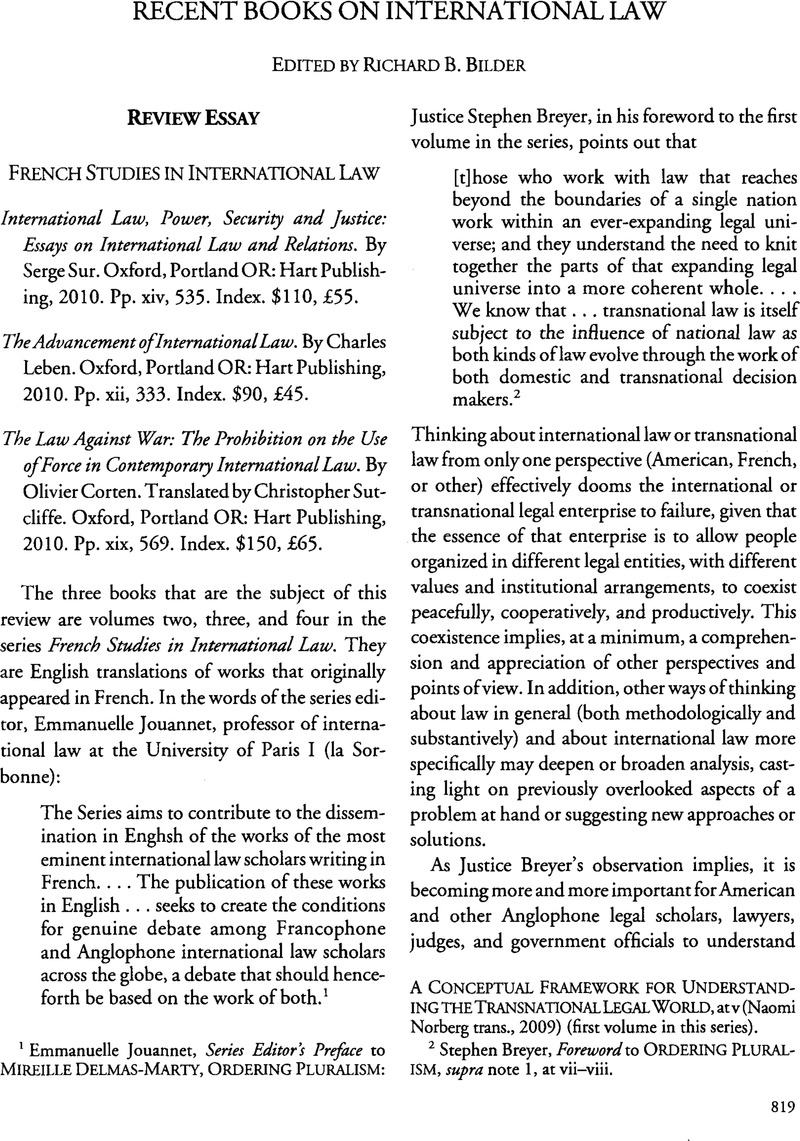No CrossRef data available.
Article contents
French Studies in International Law
Published online by Cambridge University Press: 02 March 2017
Abstract

- Type
- Recent Books on International Law
- Information
- Copyright
- Copyright © American Society of International Law 2011
References
1 Jouannet, Emmanuelle, Series Editor’s Preface to Mireille Delmas-Marty, Ordering Pluralism: A Conceptual Framework for Understanding the Transnational Legal World, at v (Naomi Norberg trans., 2009)Google Scholar (first volume in this series).
2 Breyer, Stephen, Foreword to Ordering Pluralism, supra note 1, at vii-viii Google Scholar.
3 See Conseil D’état, L’lnfluence Internationale du Droit Français (2001). “It may be possible to advance the hypothesis of a schism opposing US scholars to those from the rest of the world . . . .” Oliver Corten, the Law Against War: The Prohibition on the Use of Force in Contemporary International Law 6 (2010).
4 See, e.g., Daillier, Patrick, Pellet, Alain, Forteau, Mathias & Daniel, Müller, Droit International Public (8th ed. 2009)Google Scholar; Combacau, Jean & Sur, Serge, Droit International Public (9th ed. 2010)Google Scholar; Pierre-Marie, Dupuy & Kerbrat, Yann, Droit International Public (10th ed. 2010)Google Scholar.
5 See Jouannet, Emmanuelle, A Century of French International Law Scholarship, 61 ME. L. Rev. 83 (2009)Google Scholar; Jouannet, Emmanuelle, French and American Perspectives on International Law: Legal Cultures and International Law, 58 ME. L. Rev. 291, 299 (2006)Google Scholar (noting that “a dominant model of American legal culture [is] judicial, realist, and pragmatic, and a dominant model of French legal culture [is] legalistic, positivist, and formal”); see also Weil, Prosper, Towards Relative Normativity in International Law?, 77 AJIL 413 (1983)Google Scholar (essential reading for understanding why legal positivism is foundational in French thinking about international law). But see Marie-Claire, Belleau, The ‘Juristes Inquiets “: Legal Classicism and Criticism in Early Twentieth-Century France, 1997 Utah L. Rev. 379 Google Scholar; Noreau, Pierre & André-Jean, Arnaud, The Sociology of Law in France: Trends and Paradigms, 25 J. L. & Soc’y 257 (1998)Google Scholar.
6 See Hans Kelsen, General Theory OF Law and State (Anders Wedberg trans., 1961). “[Positivism] remains the lingua franca of most international lawyers, especially in continental Europe.” Ratner, Steven R. & Anne-Marie, Slaughter, Appraising the Method of International Law: A Prospectus for Readers, 93 AJIL 291, 293 (1999)Google Scholar.
7 See Ratner & Slaughter, supra note 6; Anne-Marie, Slaughter & Ratner, Steven R., The Method Is the Message, 93 AJIL 410 (1999)Google Scholar. For a French perspective, see Delabie, Lucie, Approches Américaines du Droit International: Entre unité et Diversité (2011)Google Scholar.
8 1 Francois, Gény, Méthode D’lnterprétation et Sources en Droit Prtvé Positif 14 (2d ed. 1919)Google Scholar (reviewer’s translation); see also Sur, Serge, L’ Interprétation en Droit International Public (1974)Google Scholar.
9 See Simma, Bruno & Paulus, Andreas L., The Responsibility of Individuals for Human Rights Abuses in Internal Conflicts: A Positivist View, 93 AJIL 302, 303 (1999)Google Scholar.
10 Franck, Thomas M., The Power of Legitimacy Among Nations 16 (1990)Google Scholar (emphasis omitted).
11 See Édouard, Lambert, Le gouvernement des juges et la lutte contre la législation social aux États-Unis:L’expérience Américaine du Contrôle Judiciaire de la Constitutionnalité Des Lois (1921)Google Scholar.
12 For an illuminating contrast between Anglo-Saxon and continental perspectives on the organization of state authority, see Mlrjan R., Damaška, The Faces of Justice and State Authority: A Comparative Approach to the Legal Process (1986)Google Scholar.
13 Kagan, Robert, of Paradise and Power: America and Europe in The New World Order (2003)Google Scholar.
14 Montesquieu, The Spirit of Laws (Thomas Nugent trans.)/Jean-Jacques Rousseau, On the Origin of Inequality on Political Economy the Social Contract (G. D. H. Cole trans.), at 69 (Univ. of Chicago Great Books 1952) (1755); see also Montesquieu, L’esprit Des Lois, Bk. XI, ch. 3 (1748) (French version).
15 Quoting Vera, Gowlland-Debbas, The Limits of Unilateral Enforcement of Community Objectives in the Framework of United Nations Peace Maintenance, 11 Eur. J. Int’l L. 361, 381 (2000)Google Scholar.
16 Military and Paramilitary Activities in and Against Nicaragua (Nicar. v. U.S.), Merits, 1986 ICJ Rep. 14 (June 27).
17 See, e.g., Corten, Olivier, La persistance de l’argument légaliste. Eléments pour une typobgie contemporaine des registres de légitimite’ dans une société libérate, in Le Discours du Droit International: Pour UN Positivisme Critique 45 (2009)Google Scholar.
18 Emmanuelle Jouannet, Présentation, in Le Discours du Droit International, supra note 17, at 31 (reviewer’s translation).




